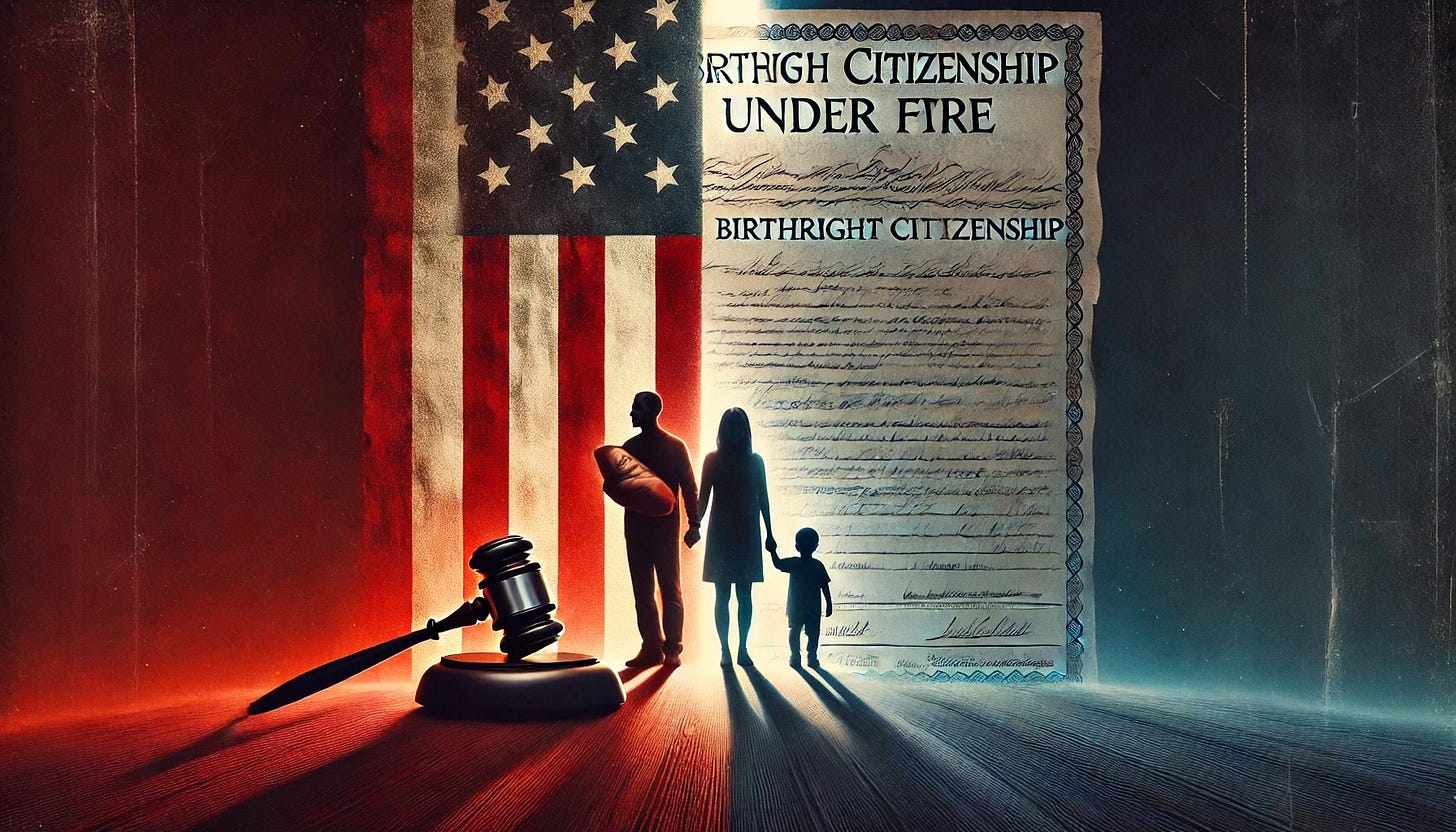Trump’s Birthright Citizenship Push: Targeting Children of Undocumented Immigrants Amid Legal and Public Opinion Battles
From Courtroom Showdowns to Regulatory Overhauls: Can the Administration Redefine Citizenship Without Constitutional Change?
The Trump administration’s fight to end birthright citizenship has thrust a contentious question into the spotlight: Should children born in the U.S. to undocumented immigrants automatically become citizens? While recent executive orders and court battles have dominated headlines, a new AP News poll reveals stark divides among Americans, with 58% supporting mass deportations of undocumented immigrants and 49% backing Trump’s stricter border policies. This article examines the administration’s legal setbacks, its potential pivot to enforcement-focused strategies, and how public opinion could shape the next phase of this constitutional clash.
Current Legal Standoff: Courts vs. the Executive Order
The Executive Order’s Core Aim:
The January 2025 order sought to strip citizenship from children of undocumented immigrants, arguing they are not “subject to the jurisdiction” of the U.S. under the 14th Amendment. Key provisions included:
Denying passports and Social Security numbers to these children.
Requiring hospitals to verify parents’ immigration status before issuing birth certificates.
Judicial Pushback:
Nationwide Injunction: A federal judge in California blocked the order, citing its conflict with United States v. Wong Kim Ark (1898), which guarantees citizenship to all U.S.-born children regardless of parental status.
Public Opinion Context: While the AP News poll shows strong support for deportation, only 38% of Americans favor ending birthright citizenship for children of undocumented immigrants—a nuance underscoring the policy’s political risk.
Strategic Pivot: Narrowing the Focus to Undocumented Immigrants
With courts rejecting broad-stroke orders, the administration could shift to targeted measures:
1. Rapid Deportation of Pregnant Undocumented Individuals
Action: Use expedited removal powers under 8 U.S.C. § 1225(b)(1) to prioritize deportation of pregnant undocumented women before childbirth.
Goal: Prevent “birthright citizenship by arrival” without directly challenging the 14th Amendment.
Risk: Humanitarian outcry over family separations and medical ethics concerns.
2. Workplace Raids and Interior Enforcement
Action: Increase ICE raids in industries reliant on undocumented labor (e.g., agriculture, construction) to deter long-term stays that could lead to childbirth in the U.S.
AP News Poll Data: 63% of respondents support stricter penalties for employers hiring undocumented workers, signaling public backing for this approach.
3. State-Federal Data Sharing on Births
Action: Require hospitals in conservative states to share data on births to undocumented parents with ICE, enabling targeted follow-up.
Model: Mirror Texas’ SB 4 (2023), which requires local law enforcement to cooperate with federal immigration authorities.
4. “Public Charge” Expansion to Childbirth
Action: Deny green cards or visa renewals to parents of U.S.-born children if they accessed Medicaid or other benefits during pregnancy, framing it as fiscal responsibility.
Poll Insight: 52% of Americans oppose providing public benefits to undocumented immigrants, per AP News.
Why the Focus on Undocumented Immigrants?
Political Calculus: The AP News poll shows 71% of Republicans support ending birthright citizenship for children of undocumented immigrants, compared to just 28% of Democrats. This aligns with the administration’s base-driven strategy.
Legal Feasibility: Narrower enforcement actions (e.g., deportations, workplace raids) face fewer constitutional hurdles than redefining citizenship outright.
Narrative Control: Emphasizing “illegal immigration” rather than birth tourism allows the administration to frame the issue as a matter of law and order, not racial or gender bias.
Risks and Challenges
Humanitarian Concerns:
Stateless Children: Children born to parents from countries like El Salvador or Guatemala (restrictive citizenship laws) could lack any nationality.
Medical Avoidance: Fear of deportation may push undocumented women to avoid prenatal care, risking maternal and infant health.
Legal Vulnerabilities:
Equal Protection Claims: Courts could rule that selective enforcement based on pregnancy status violates the Fifth Amendment.
Plyler v. Doe Precedent: The Supreme Court has barred states from denying public education to undocumented children, signaling skepticism of tiered rights.
Political Backlash:
While the AP News poll shows support for deportation, 65% of Americans also believe undocumented immigrants contribute to the economy. Overreach could alienate moderates.
Expert Analysis: A Path Fraught with Peril
Cecilia Muñoz (Former Obama Immigration Advisor): “This isn’t just legally dubious—it’s morally indefensible. Punishing children for their parents’ status contradicts American values.”
Mark Krikorian (Center for Immigration Studies): “The 14th Amendment was never meant to be a loophole for illegal immigration. The administration is right to test its boundaries.”
Conclusion: A High-Wire Act With No Safety Net
The Trump administration’s bid to end birthright citizenship for children of undocumented immigrants hinges on a precarious balance: leveraging public frustration over border security while navigating legal and ethical landmines. Though the courts remain a formidable barrier, targeted enforcement and data-driven rhetoric could keep the issue alive in the 2026 midterms.
Yet the stakes couldn’t be higher. However the administration pivots, its actions will test the resilience of the 14th Amendment’s promise—that in America, equality begins at birth.
Your Turn: Should children of undocumented immigrants retain birthright citizenship, or is this a loophole that needs closing?

